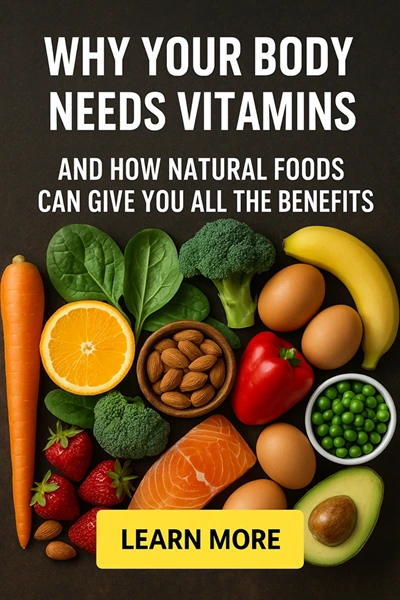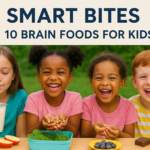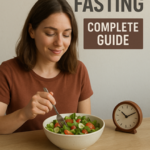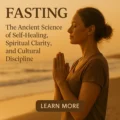We all hear about how important vitamins are. Doctors recommend them, dietitians talk about them, and we often see advertisements promoting multivitamin capsules or gummies. But have you ever wondered what exactly these vitamins do for your body? And more importantly, can you get enough of them without popping pills?
In this guide, we’re diving deep into the world of vitamins, the ones your body truly needs to stay strong, energized, and thriving. We’ll also explore how you can get each of them from natural, everyday food sources you may already have in your kitchen.
Let’s walk through the essentials, one vitamin at a time.
What Are Vitamins and Why Do We Need Them?
Vitamins are organic compounds that your body needs in small amounts to function properly. They play crucial roles in everything from maintaining healthy skin and bones to supporting your immune system and brain function. Without them, even basic bodily functions can go haywire.
Now, the key thing to remember is this your body either doesn’t make vitamins at all or produces them in such small quantities that you must get them through food. That’s why a balanced diet is so important.
There are two types of vitamins:
- Water soluble vitamins like vitamin C and the B complex group. These don’t get stored in your body and need to be replenished regularly.
- Fat soluble vitamins like A, D, E, and K. These are stored in your body’s fat tissues and liver.
Let’s now look at each vitamin, what it does for your body, and where you can find it in natural foods.
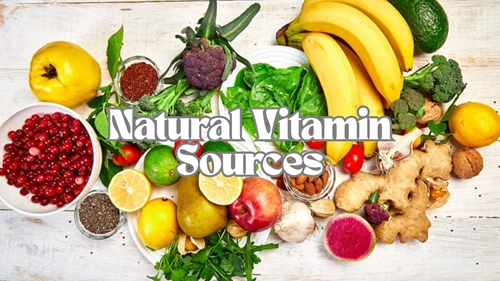
Vitamin A – For Vision, Skin, and Immunity
Why it matters:
Vitamin A is essential for good vision, especially at night. It helps maintain healthy skin and supports your immune system by keeping your organs and tissues in top shape.
Signs you might be lacking it:
Dry skin, poor night vision, or frequent infections.
Natural food sources:
- Carrots
- Sweet potatoes
- Spinach
- Kale
- Eggs
- Liver
- Mangoes
- Red and yellow bell peppers
Bright colored vegetables and fruits are typically rich in beta carotene, which your body converts into vitamin A. So, if your plate looks like a rainbow, you’re probably doing something right.
Vitamin B1 (Thiamine) – For Energy and Nerve Health
Why it matters:
Thiamine helps convert carbohydrates into energy and keeps your nerves functioning smoothly.
Signs you might be lacking it:
Fatigue, irritability, muscle weakness, or nerve tingling.
Natural food sources:
- Whole grains
- Brown rice
- Nuts
- Seeds
- Legumes like lentils and black beans
- Pork
- Green peas
People who drink alcohol heavily are especially at risk of deficiency, as alcohol interferes with thiamine absorption.
Vitamin B2 (Riboflavin) – For Cell Growth and Skin Health
Why it matters:
Riboflavin supports energy production and helps in the repair of skin, eyes, and blood cells.
Signs you might be lacking it:
Cracks at the corners of your mouth, sore throat, or inflamed tongue.
Natural food sources:
- Milk and dairy products
- Eggs
- Almonds
- Mushrooms
- Green leafy vegetables
Pro tip: Riboflavin is sensitive to light. So avoid keeping milk in transparent bottles if you want it to retain its vitamin content.
Vitamin B3 (Niacin) – For Metabolism and Healthy Skin
Why it matters:
Niacin helps in converting food into usable energy and supports healthy skin and digestion.
Signs you might be lacking it:
Pellagra, which causes inflamed skin, diarrhea, and even mental confusion.
Natural food sources:
- Chicken
- Turkey
- Tuna
- Mushrooms
- Whole wheat bread
- Peanuts
- Brown rice
A well balanced Indian vegetarian thali with grains, pulses, and vegetables can usually provide decent levels of B3.
Vitamin B5 (Pantothenic Acid) – For Hormones and Skin
Why it matters:
B5 is important for producing energy, hormones, and even the red blood cells your body needs.
Signs you might be lacking it:
Numbness, fatigue, or a burning sensation in your feet.
Natural food sources:
- Avocados
- Sunflower seeds
- Broccoli
- Chicken
- Eggs
- Mushrooms
This vitamin is found in a wide variety of foods, which is why it’s called “pantothenic” , from the Greek word “pantou”, meaning “everywhere”.
Vitamin B6 – For Brain Health and Immunity
Why it matters:
Vitamin B6 is crucial for brain development and function. It also helps your body make the hormones serotonin and norepinephrine.
Signs you might be lacking it:
Depression, confusion, and weakened immunity.
Natural food sources:
- Bananas
- Potatoes
- Chicken
- Fish
- Fortified cereals
- Nuts
This is one vitamin that works best when taken along with the other B complex members.
Vitamin B7 (Biotin) – For Hair, Skin, and Nails
Why it matters:
Biotin is widely marketed for improving hair and nail strength, but it also helps your body use fats, carbohydrates, and proteins.
Signs you might be lacking it:
Hair thinning, brittle nails, and skin rashes.
Natural food sources:
- Eggs (especially the yolk)
- Walnuts
- Soybeans
- Cauliflower
- Sweet potatoes
Raw egg whites can block the absorption of biotin, so make sure to cook them well.
Vitamin B9 (Folate) – For Pregnancy and Cell Growth
Why it matters:
Folate is essential for DNA synthesis and cell growth. It is particularly crucial for pregnant women to prevent neural tube defects in babies.
Signs you might be lacking it:
Fatigue, irritability, or birth defects in newborns.
Natural food sources:
- Spinach
- Broccoli
- Asparagus
- Lentils
- Oranges
- Beets
If you’re planning for a baby, increasing folate intake is one of the best things you can do early on.
Vitamin B12 – For Nerves and Red Blood Cells
Why it matters:
B12 is key to healthy nerve cells and red blood cell production. It also supports DNA synthesis and brain function.
Signs you might be lacking it:
Memory issues, fatigue, or even tingling hands and feet.
Natural food sources:
- Fish
- Meat
- Eggs
- Dairy
- Fortified cereals (for vegetarians)
Strict vegetarians or vegans are at higher risk of deficiency and may need fortified foods or supplements.
Vitamin C – For Immunity and Healing
Why it matters:
Vitamin C is a powerful antioxidant that strengthens your immune system, helps in wound healing, and boosts collagen production for skin.
Signs you might be lacking it:
Bleeding gums, slow wound healing, or frequent colds.
Natural food sources:
- Oranges
- Lemons
- Amla (Indian gooseberry)
- Guavas
- Strawberries
- Tomatoes
- Bell peppers
Cooking can destroy vitamin C, so try to eat these foods raw or lightly cooked.
Vitamin D – For Bones and Mood
Why it matters:
Vitamin D helps your body absorb calcium, supports bone health, and may even improve your mood and immunity.
Signs you might be lacking it:
Bone pain, muscle weakness, or feelings of sadness and fatigue.
Natural sources:
- Sunlight (your skin produces vitamin D when exposed to sun)
- Fatty fish like salmon and sardines
- Egg yolks
- Fortified milk and cereals
- Mushrooms exposed to sunlight
Since sunlight is the best source, make sure to get at least 15 minutes of direct sun exposure daily, ideally in the morning.
Vitamin E – For Skin and Cell Protection
Why it matters:
Vitamin E acts as an antioxidant, protecting your cells from damage. It also supports healthy skin and eyes.
Signs you might be lacking it:
Dry skin, vision problems, or weakened immunity.
Natural food sources:
- Almonds
- Sunflower seeds
- Spinach
- Avocados
- Peanut butter
- Olive oil
This vitamin works beautifully with vitamin C in enhancing skin health.
Vitamin K – For Blood Clotting and Bones
Why it matters:
Vitamin K is necessary for blood clotting and plays a role in keeping bones healthy and strong.
Signs you might be lacking it:
Easy bruising, excessive bleeding from wounds, or bone fractures.
Natural food sources:
- Kale
- Spinach
- Broccoli
- Cabbage
- Green beans
- Soybean oil
If you’re on blood thinning medications, you’ll need to monitor your vitamin K intake with your doctor’s help.
Final Thoughts – Get Your Vitamins the Natural Way
The beauty of vitamins is that you don’t need to rely solely on supplements. Nature has already provided everything we need in the form of fruits, vegetables, nuts, seeds, whole grains, dairy, and sunlight. The more diverse your diet, the more likely you are to get all the essential vitamins your body craves.
Here are a few simple ways to make sure you’re getting your daily dose:
- Include at least five servings of fruits and vegetables in your meals.
- Eat whole grains, not refined ones.
- Add nuts and seeds to your snacks or breakfast.
- Get some sun exposure every day.
- Consider fortified foods if you’re vegan or have dietary restrictions.
Eating a colorful, varied, and wholesome diet is the easiest and most natural way to stay healthy, energetic, and strong.
Frequently Asked Questions
Q. Can I take multivitamin supplements instead of eating a healthy diet?
Supplements can be helpful in some cases, but they should never replace a balanced diet. Your body absorbs nutrients better from whole foods.
Q. How do I know if I have a vitamin deficiency?
Blood tests and symptoms like fatigue, poor immunity, or skin problems can indicate deficiencies. Consult your doctor if you suspect something is off.
Q. Can too many vitamins be harmful?
Yes. Especially fat soluble vitamins like A, D, E, and K which are stored in your body. Always stick to recommended daily intakes.
Q. What’s the best time to eat vitamin rich foods?
Water soluble vitamins are best taken in small amounts throughout the day. Fat soluble ones are better absorbed with a meal containing some fat.
Read More About Health & Lifestyle related posts on Popnewsblend.com.

Hi, I’m Prashant Jain — a curious soul, storyteller, and content creator at heart.I’ve always been drawn to the world of entertainment, travel, sports, health & lifestyle — not just as a writer, but as someone who genuinely lives these experiences. Whether I’m binge-watching the latest OTT series, exploring offbeat spiritual destinations in India, or diving deep into wellness routines and cricket match insights, I love sharing what I discover with like-minded readers.
PopNewsBlend is my way of blending personal journeys with meaningful stories — ones that inform, inspire, and keep you ahead of the curve. Everything I write comes from real observations, hands-on experiences, and a deep passion for understanding the world around us.
Discover more from Popnewsblend
Subscribe to get the latest posts sent to your email.

